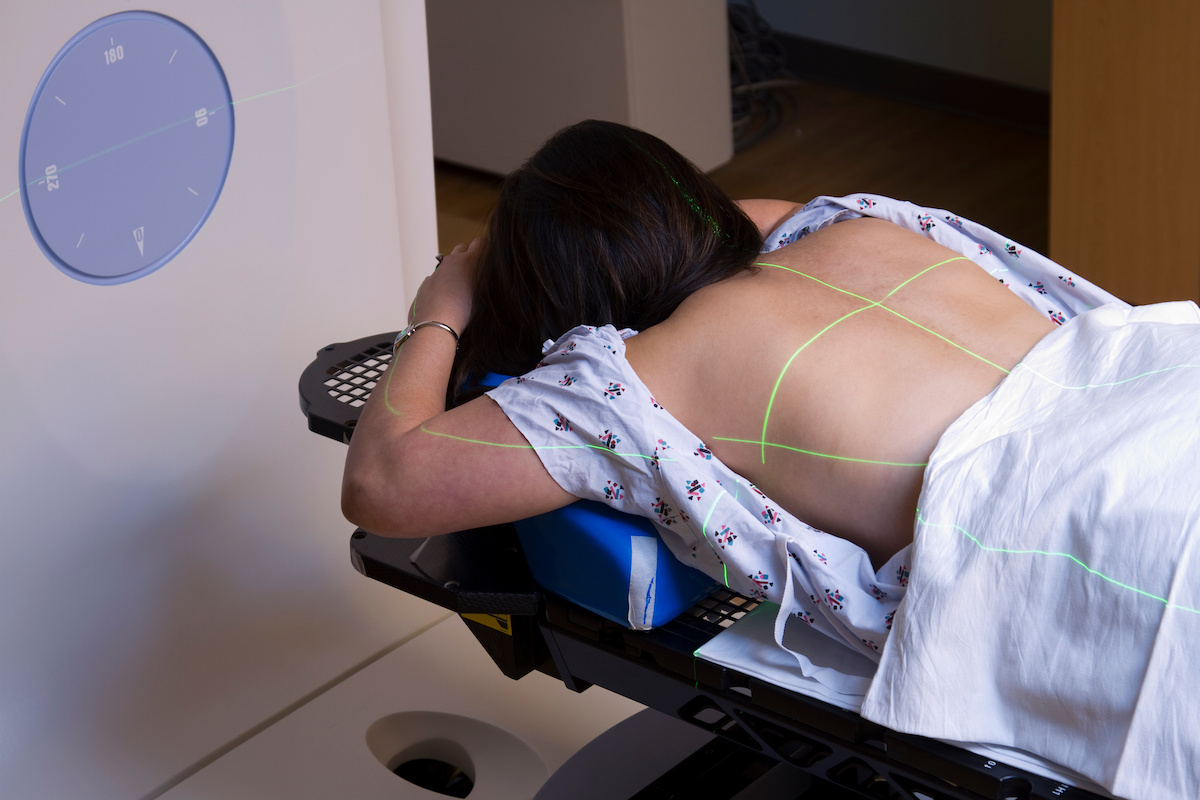When is Radiation Therapy Used to Treat Lung Cancer?
6 min read

There are many different approaches used to treat lung cancer depending on the specific type, stage, and location of the tumor(s). Surgery, radiation therapy, chemotherapy, and targeted therapy are some of the most commonly used approaches to lung cancer treatment. Because every cancer diagnosis is different, treatment plans vary from person to person. In certain situations, radiation therapy is included in the treatment plan. The goals of radiation therapy can vary, however, based on the patient’s specific situation.
Types of Radiation Therapy Used for Lung Cancer
There are two types of radiation therapy: external and internal. External beam is the type most often used for lung cancer, although internal radiation can be used for some. Let’s look at how these technologies are used.
External Beam Radiation Therapy
This is the most commonly used type of radiation therapy for lung cancer. A machine called a linear accelerator is positioned over the body to deliver radiation beams to the exact shape and size of the tumor or tumors.
There are two different types of external beam radiation therapy that are most often used for lung cancer:
- 3-dimensional conformal or intensity-modulated radiation therapy (IMRT). IMRT uses a CT scan to guide the planning of treatment. Because tumors are irregularly shaped, the beams need to conform to what is seen in the CT imaging. Some areas of the tumor may need more radiation than other areas which can be controlled with this machine. Treatments can last a few weeks with sessions every day.
- Stereotactic body radiation therapy (SBRT). Images are used to pinpoint smaller tumors in the chest area. Because tumors in the lungs can move due to breathing, a scan is done before each session to be sure the radiation is targeting the correct location. With SBRT the dose of radiation in each session is higher than IMRT. This means that only a few sessions are needed over the course of a week or two. Fewer treatments reduce the impact on other areas of the body.
Internal Radiation Therapy for Small Cell Lung Cancer
Internal radiation therapy involves the placement of sealed radiation material (such as radioactive seeds) into the body where it’s left for a short period of time and then removed. This is also called brachytherapy. While it’s not widely used for lung cancer, it is proven to help patients who have cancer blocking their airway (bronchial tubes). By placing radiation inside the chest, the tumor blocking the airway can be reduced rather quickly in most cases giving the patient a better quality of life.
When is Radiation Used in the Lung Cancer Treatment Process?
If radiation therapy is used, it can be included at several points throughout the cancer treatment process. The timing depends on how widespread the tumors are and whether the patient is a candidate for surgery to remove the cancer.
Before Lung Cancer Surgery
Radiation therapy may be recommended before surgery to help shrink the size of the tumor and make surgery less complicated. A smaller tumor is usually easier to remove and limits the tumor's ability to spread cancer cells in the chest cavity during surgery.
As the Primary Lung Cancer Treatment
In some instances, radiation therapy may be used as the primary treatment for treating lung cancer because the patient may not be able to undergo surgery. This is where SBRT can be a useful treatment method.
Radiation Therapy After Surgery
Sometimes, even after successful surgery, some small cancer cells may still be left behind, which can then grow and cause a cancer recurrence. Radiation therapy may be used after surgery to help ensure that all of the cancer cells have been killed.
Treating Lung Cancer Tumors in Other Areas of the Body
Because lung cancer is often found in a later stage, when it’s spread to other areas of the body, radiation can be used to shrink tumors outside of the lungs that may be causing pain or blocking an airway. This is sometimes referred to as palliative radiation therapy.
How Does Your Oncologist Decide if Radiation Therapy is Right for You?
As part of the lung cancer treatment planning process, a team of cancer specialists will meet to discuss your specific situation and agree on a recommended set of treatments and the order in which they should be given. This will be discussed with the patient, and any options that may be available will also be presented.
Learn more about who is on the lung cancer treatment team.
Important considerations when deciding if and how to use radiation therapy include:
- Stage of the lung cancer. If it’s locally advanced (Stage III) non-small cell lung cancer or limited stage small cell lung cancer then radiation tends to be used to shrink the tumor with the intent of surgery as a follow-up to remove all of the cancer.
- The overall age and health of the patient. Some patients wouldn’t do well with a surgery to remove the lung cancer. In those cases, radiation may be the primary treatment method.
- Previous radiation therapy. If the treatment plan is being created for a patient with recurrent lung cancer, the oncologists will review any past radiation treatments to determine if this type of therapy is an option in this round of treatments.
The Radiation Therapy Treatment Process
The radiation therapy process starts with a planning session, in which you will have a CT scan to carefully identify the location and shape of the tumor. Based on this, you’ll be placed on the radiation therapy machine so they can be sure they put you in the exact same spot during each session. Small tattoos or markings may be used so they can line up your body in the same place every time. Wear something comfortable for this planning session and for each of the radiation therapy treatment sessions.
IMRT radiation for lung cancer typically involves sessions five days per week for 5 to 7 weeks. You may be eligible for hypofractionated radiation therapy, which delivers a higher dose of radiation during each session, reducing the overall treatment time to 3-5 weeks. Every treatment plan is different, so the number of sessions you’ll need will vary based on your doctor’s recommendations.
SBRT may require only a few sessions over the course of a week or so. This is mostly used for small, localized tumors.
Lung Cancer Radiation Therapy Side Effects
Some common side effects of radiation therapy for lung cancer include:
- Skin irritation similar to a sunburn
- Cough due to irritation of the airways
- Dry mouth because the radiation may be near your throat
- Fatigue
- Shortness of breath
- Sore throat
- Nausea
Talk to your oncology team about any side effects you’re feeling, whether from radiation therapy or other cancer treatments. They often have ways of guiding you through so you can feel better quickly.
The Lung Cancer Treatment Team at RMCC is Here For You
The lung cancer specialists at Rocky Mountain Cancer Centers will help you through every step of the treatment process, which often includes radiation therapy. Most often, you will meet with a medical oncologist first, who will meet with the radiation oncologist, surgeon, and any other team members who will be a part of the treatment planning process.
If you or a loved one has received a lung cancer diagnosis, find the Rocky Mountain Cancer Centers location throughout Colorado for a consultation. We are also available to provide second opinions on a treatment recommendation whether this is an initial diagnosis or if lung cancer has returned.


